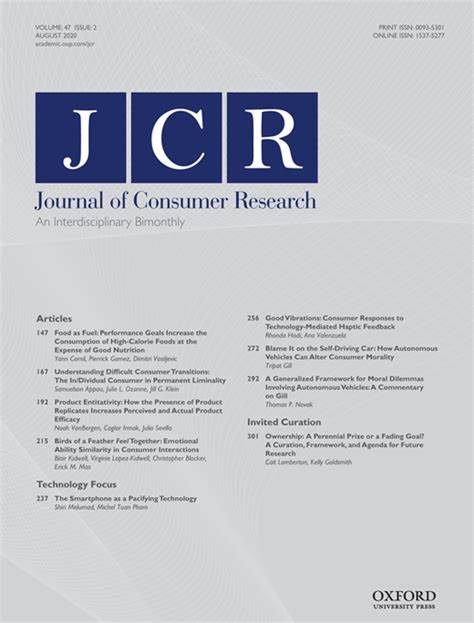How Do Physical Disability Cues Influence Assumptions about Consumer Tastes? Unpacking the Disability Preference Stereotype
IF 5.7
1区 管理学
Q1 BUSINESS
引用次数: 0
Abstract
Across ten experimental studies, this research identifies and provides evidence of a disability preference stereotype whereby observers infer that disabled consumers prefer utilitarian products more than nondisabled consumers, and prefer hedonic products less than nondisabled consumers. We show that this stereotype occurs because of societal associations between physical disability and pity. Pity elicits a multidimensional response such that considering the interests of a disabled person increases feelings of personal discomfort, driving both an inclination to help (help-giving orientation) and a tendency to assess the perceived misfortune (misfortune appraisal) in parallel. Thus, when considering the preferences of disabled individuals, the help-giving orientation increases focus on functional (utilitarian) goods, while the misfortune appraisal decreases focus on pleasurable (hedonic) goods. Importantly, this stereotype can be mitigated through increased disability representation. Representation of empowered disabled individuals in media can dampen the help-giving orientation, reducing inferred utilitarian preferences, while representation of disabled people partaking in daily pleasures through increased accessibility can reduce misfortune perceptions, increasing inferred hedonic preferences. This work addresses the paucity of disability-related consumer research, identifies how aspects unique to consumption can limit consumers with disabilities, and highlights opportunities to minimize ableist stereotypes by expanding representation and increasing marketplace inclusion.身体残疾线索如何影响对消费者品味的假设?解读残疾偏好刻板印象
通过十项实验研究,本研究发现并提供了残疾偏好刻板印象的证据,即观察者推断残疾消费者比非残疾消费者更喜欢功利性产品,而比非残疾消费者更不喜欢享乐性产品。我们的研究表明,之所以会出现这种刻板印象,是因为社会将身体残疾与怜悯联系在了一起。怜悯会引起多方面的反应,例如,考虑残疾人的利益会增加个人的不适感,同时推动帮助倾向(给予帮助取向)和评估感知到的不幸(不幸评价)的倾向。因此,在考虑残疾人的偏好时,给予帮助的倾向会增加对功能性(功利性)物品的关注,而对不幸的评价则会减少对愉悦性(享乐性)物品的关注。重要的是,这种刻板印象可以通过增加残疾人的代表性来缓解。在媒体中表现有能力的残疾人可以抑制给予帮助的倾向,从而减少推断的功利性偏好,而通过增加无障碍环境表现残疾人参与日常乐趣可以减少对不幸的感知,从而增加推断的享乐性偏好。这项研究解决了与残疾有关的消费者研究匮乏的问题,确定了消费的独特方面如何限制残疾消费者,并强调了通过扩大代表性和提高市场包容性来尽量减少对残疾人的刻板印象的机会。
本文章由计算机程序翻译,如有差异,请以英文原文为准。
求助全文
约1分钟内获得全文
求助全文
来源期刊

Journal of Consumer Research
BUSINESS-
CiteScore
12.00
自引率
9.70%
发文量
53
期刊介绍:
Journal of Consumer Research, established in 1974, is a reputable journal that publishes high-quality empirical, theoretical, and methodological papers on a wide range of consumer research topics. The primary objective of JCR is to contribute to the advancement of understanding consumer behavior and the practice of consumer research.
To be considered for publication in JCR, a paper must make a significant contribution to the existing body of knowledge in consumer research. It should aim to build upon, deepen, or challenge previous studies in the field of consumption, while providing both conceptual and empirical evidence to support its findings.
JCR prioritizes multidisciplinary perspectives, encouraging contributions from various disciplines, methodological approaches, theoretical frameworks, and substantive problem areas. The journal aims to cater to a diverse readership base by welcoming articles derived from different orientations and paradigms.
Overall, JCR is a valuable platform for scholars and researchers to share their work and contribute to the advancement of consumer research.
 求助内容:
求助内容: 应助结果提醒方式:
应助结果提醒方式:


